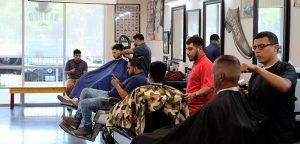Texas is now one of the most culturally and ethnically diverse states in the country right behind California, according to a new study by Wallethub.
The study ranks Texas second in the nation overall in diversity, with the state earning high marks across several factors, such as industry, linguistic and racial and ethnic diversity.
The history of Texas encompasses a vast majority of different cultures and ideas, stemming from a variety of Americans, indigenous and Mexican ethnic groups.
“More than a third of the state’s population is Hispanic or Latino, and consequently, Spanish is spoken in almost 30 percent of Texas households.”
–Jill Gonzalez, an analyst at Wallethub
Together, these groups, paired with a vast array of immigrants from Central, South America and Asia, pool together a group of 28 million people that is more diverse than it ever has been, according to the study.
“More than a third of the state’s population is Hispanic or Latino, and consequently, Spanish is spoken in almost 30 percent of Texas households,” said Jill Gonzalez, an analyst at Wallethub. “In terms of birthplace diversity, 60 percent of residents are born in the state and almost 17 percent are foreign-born.”
Despite the Lone Star State’s ethnic and cultural diversity, political diversity ranks in the bottom half of the list. Texas is currently 30th in political diversity in the country, according to the study.
Minorities are among the most underrepresented ethnic groups in the state, despite Texas not having a clear racial majority.
According to the 2013 U.S. Census, Hispanics, Blacks and Asian populations in Texas were all underrepresented in Texas politics, while Whites were almost 20 percent overrepresented.
Rosina Valle, President of the Centro Cultural Hispano de San Marcos, a cultural activist organization in San Marcos, said the organization works to provide cultural and ethnic educational activities for the citizens of Hays County.
“We need to continue with our leadership initiatives,” Valle said. “We have four Hispanics on school board and one on the city council. It’s not where it needs to be but we are currently working on a partnership with Texas State to provide a leadership camp for our youth.”
While a non-partisan organization, Valle said Centro Cultural encourages all the citizens of the county to run for public office or service on various boards and commissions.
The U.S. Census Bureau predicts that the United States will no longer have a single ethnic majority by 2044, and Texas will follow that national trend.
In Hays County, 30 percent of citizens are Hispanic, right above the national average, according to the U.S. Census Bureau.
Texas also ranked 6th in religious diversity. Athough a majority of the state’s religious affiliation is Christian, the Texas Almanac reports that 10 million Texans are not claimed by a religious group.
Additionally, Texas has around 500,000 practicing Muslims, which surpasses the number of Presbyterian and Episcopal Church members and the Church of Latter-Day Saints.
“We’re proud that we do serve people from all walks of life and from different ethnic and socioeconomic groups that participate in our programs,” Valle said. “San Marcos and Hays County are very diverse and we want to bring a sense of inclusion to all of the citizens.”








